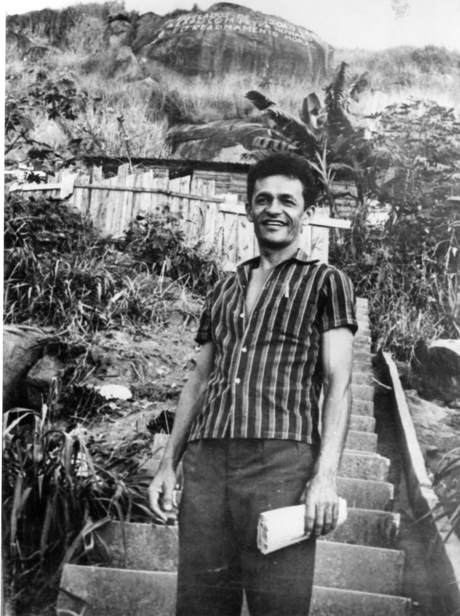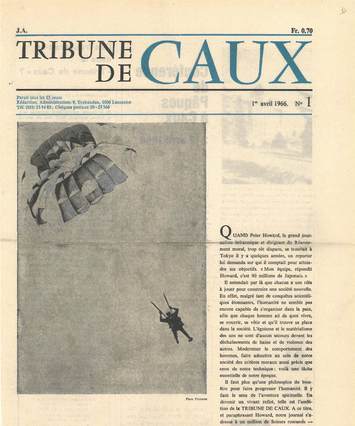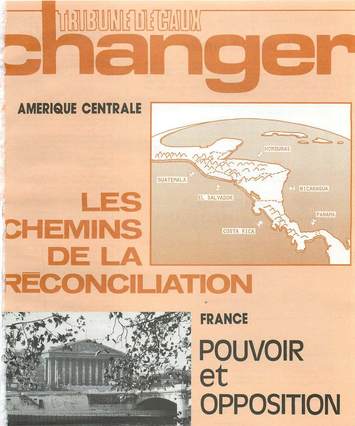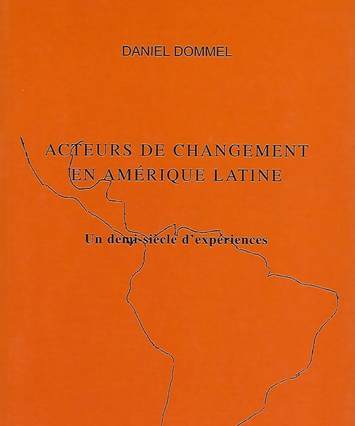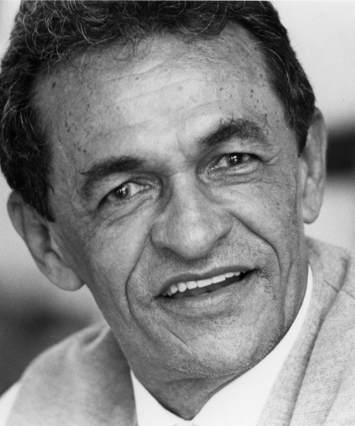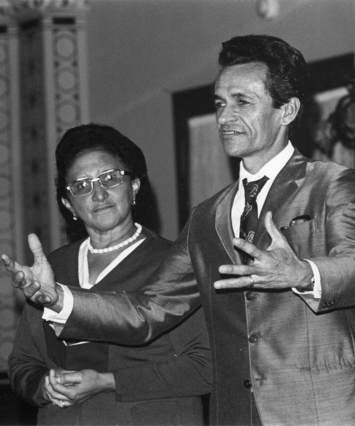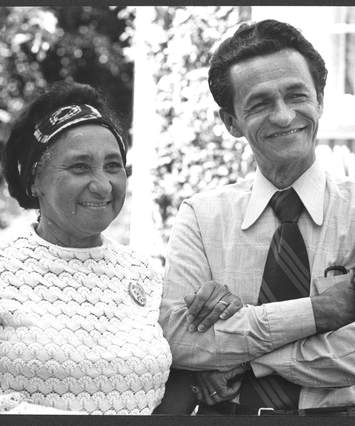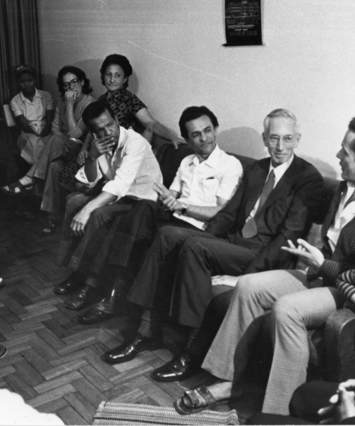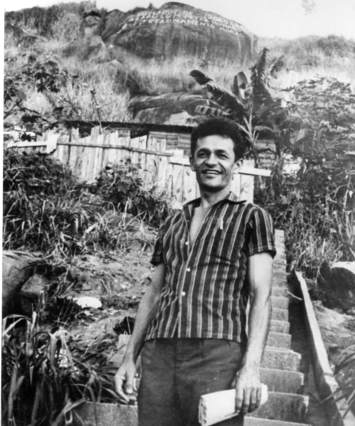Originally from Fortaleza, in the North East of Brazil, Luiz Pereira moved to Rio de Janeiro with his wife Edir Trigueiro and their five children. Like any migrant from the northeast in search of better opportunities in the 'wonderful city', he faced the natural difficulties anyone else would in the 1960's. At the time, Luiz and Edir had been married for eight years. Edir was 25 years old. Luiz moved to Rio first, before the rest of the family. He was a handsome young man who loved to dance. After a few months, people around Edir began to tease her, saying, "Luiz must have made some conquests. He will never come back." Edir decided to travel without telling him, bringing their children and few belongings to join her husband. He had found a small house, hardly worthy of being called a home, in Niterói, on the other side of the bay in Rio. The crossing was by ferry; at that time, the 14-kilometer bridge linking the two places had not yet been built. Luiz, who worked laying floor tiles, had to leave home at four in the morning to be at work by seven. The house in Niterói was damp, without water or electricity and situated at the top of a hill. Edir spent her time going down to fetch water, which she then had to carry uphill. But Edir was proud. She wrote home to Fortaleza saying that all was well and gave the address of a house belonging to someone else who lived at the bottom of the hill.
After five months in this situation, Edir reluctantly agreed to live near an aunt who lived in Favela São João. All this was difficult. She had had a comfortable life in the northeast, her father earned a good salary. Again, the aunt's house was at the top of a steep hill. Luiz had to build a fence to keep the children from falling. Edir had to climb down and queue at the public tap to get water before returning on a rocky path, with a full can of water on her head. Ashamed of her situation, she did not make friends with her neighbours. If someone knocked on the door, she hid and pretended not to be there. Luiz adapted better and became very popular in the favela. A good samba player, he participated in all the parties and festivals, but he never took his family with him. After a few years - 12 long years - Edir became increasingly bitter. She talked continually of separating. But without money, where could she go? Her insistence provoked more and more arguments at home.
Meanwhile, tensions were rising in the favela. The owner of the land on which the favela residents had built their homes threatened to evict them. He began to carry out his threat, demolishing 37 houses. Neighbours took in the homeless while they awaited their reconstruction. Luiz was one of those who took it on himself to defend the favela residents. After an incident with the police, he met José de Almeida, who taught him to start the day with a time of silence, turning to God for guidance in the decisions he had to make. José de Almeida introduced him to the Oxford Group and to Frank Buchman's "Moral Rearmament" doctrine. This new experience gave Luiz Pereira the opportunity to travel the world. Now he worked not only for social causes and projects, but also for noble and valuable human concepts, such as absolute honesty, purity, unselfishness and total love in favour of the family unit; the main concepts of the ideology of Moral Rearmament.
After some time practicing a regular time of silence, Edir noticed a change in her husband. He stopped drinking and started taking her to neighbourhood parties. She noticed her husband's new inner strength. One morning, Luiz thought of going to the State Governor to ask for help. During the inauguration of a new school, he managed to reach him and say a few words. He achieved his goal - the expulsions stopped. But Luiz's activities occupied all his time to the detriment of their family life. He became involved in disputes, which worried Edir and the daily hardships of life in the favelas continued.
One day during a peaceful siesta at a doctor's house where he was laying tiles, Luiz was thinking deeply about the situation in his favela. He had an idea: "Call the Minister of the Interior". But what chance did he have of reaching him? Nevertheless, without wasting another moment procrastinating, he acted immediately. To his great surprise, he managed to get in touch with the Minister, who told him to come and see him. So, a few days later, he was received along with some of the others involved. Luiz told the Minister about the 560 families in the favela, the risk of eviction which they were facing and the relocation plan he had drawn up. Although his plan was not viable, an alternative was found. After lengthy negotiations, the favela residents were offered new apartments merely a few hundred meters from their original homes.
During the construction work, Luiz realised that many of those involved in the construction were unskilled. He asked those who seemed more skilled to teach their trade to the others, and they did. Upon learning what was happening, the State Governor officially endorsed the practice, giving those approved as instructors a bonus in recognition of what they were doing. Meanwhile, women from outside the favela went to teach the wives of those workers how to cook with gas (there would be no more wood fires), and some other useful tips on how to live in an apartment.
Once the work began, things developed quickly. From their precarious dwellings, favela residents could watch the new buildings going up. They were to become recognized citizens, like everyone else, with an address of their own. The day came when the removal lorries arrived to take them and their belongings to the new compound, one house after another. Edir's turn came on 20 May 1971. Entering the kitchen and bathroom, she stopped in front of the taps, hardly able to believe that this was the end of long years of carrying water.
As a family, they became much closer. Professionally, Luiz learned to work as part of a team. He and Edir would organize weekly meetings of friends and workmates to help solve problems in the area. Then, during the summer of 1973, they were invited to join the Brazilian delegation at Caux. Edir was not sure. Luiz was convinced they should go and insisted that Edir go with him. People helped finance the trip and they themselves contributed as much as they could.
In Caux they received a warm welcome. One evening, dining with a young couple, the other woman recounted how she had come to love someone she hated. After dinner, Edir went to her room. She needed to be alone. She wanted to sleep, but couldn't. Images came to her of Fortaleza and her mother living there. The last time they had seen each other was in Rio, in the favela. Her mother kept comparing Edir to her sisters, who lived in nice houses. Edir was envious of them. Mother and daughter argued and her mother left, saying she would never come back. Edir replied that, in that case, she would never want to see her mother again. This troubled situation went on for 10 years.
The thought came to Edir to write to her mother to ask her forgiveness. She did so the next day. She did not expect a reply but it came very quickly, just before they left Switzerland. Back home, she showed it to their children. She thought she should go to Fortaleza with Luiz. Her son offered to pay for the trip. It was long and tiring, three days and two nights by bus, but Edir had no regrets. Six months after the reconciliation, her mother died.
Luiz and Edir had managed to change the conditions of their own lives, but after all they had been through, they could not stop there: "We must help all those who still live in the favelas so that one day they will have a house like ours. We must also fight that the community spirit born in those wooden shacks does not die between the concrete walls of our new apartments and houses". After much prodding, broader conversations ensued. The hardest decision Luiz had to make was to affirm to his peers his opposition to violence. "It's always the toughest man who becomes the boss, and I was afraid of being seen as a coward," he said. Far from being a coward, he persevered, took risks and kept a cool head, stood firm in the midst of fighting between rival clans and earned the respect of the "godfathers" of the favelas, who did not dare to openly attack the protagonists of these social initiatives, which were so much appreciated by the people. Luiz was delighted when he saw tens of thousands of new houses being built to rehouse the favela dwellers.
These and many other life improvements were accomplished by a couple who sought God's inspiration in the silence every morning and acted in obedience to what they understood to be their vocation. They were conscious of exercising their citizenship, not only for Brazil, but also for the world.
Sources:
- Daniel Dommel's book "Moral Rearmament in Latin America".
- Thesis "The backstage of history and its anonymous characters" Author: Alexandre Jairo dos Santos (Luiz Pereira's son-in-law).

